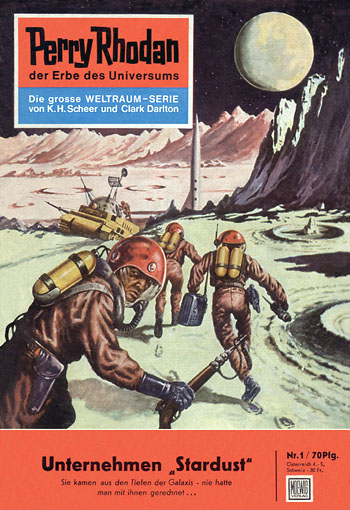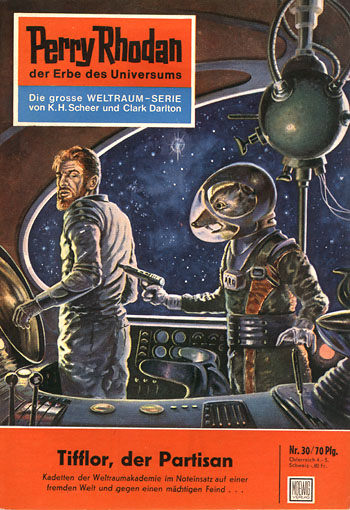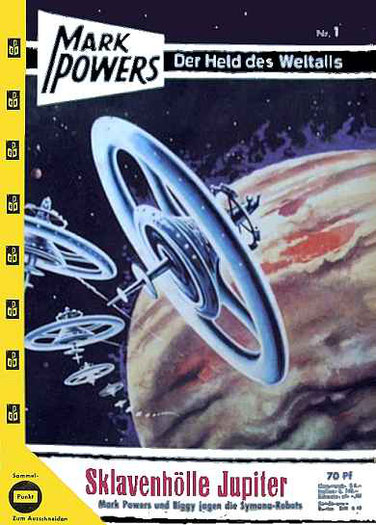
by Cora Buhlert
I'm back to continue my overview of (West) German science fiction begun last month. Today, I'll talk about Perry Rhodan, Germany's most successful science fiction series. The brainchild of writers Clark Dalton a.k.a. Walter Ernsting and K.H. Scheer, the "Heftroman" series Perry Rhodan started two years ago, in September 1961, and will reach its landmark 100th issue in a couple of weeks.

"Unternehmen Stardust", the first issue of Perry Rhodan, begins in the not so far off future of 1971. International tensions are running high and the Western Bloc, the somewhat diminished Eastern Bloc and the rising Asian Federation are at each other's throats. In this climate, the spaceship Stardust under the command of Major Perry Rhodan of the US Space Force embarks on humanity's first trip to the moon. However, Rhodan and his crew find more than they bargained for when they come across an alien spaceship that crashed on the moon months before. Aboard the spaceship, Perry Rhodan and fellow crewmember Reginald Bull encounter the Arkonoids, a group of humanoid aliens led by the striking Thora de Zoltral and the scientist Crest de Zoltral. The Arkonoids were on a mission to locate the legendary planet of eternal life in order to heal the cancer-stricken Crest, when their ship crashed.
Thora is initially suspicious about the humans and their motives, though she is also fascinated by Perry Rhodan. Crest is more open towards the Earthmen and quickly strikes up a friendship with Rhodan, who offers to take him back to Earth for treatment (apparently, cancer treatment will make great advances in the eight years until then).
However, instead of returning to the US, Rhodan lands the Stardust with Crest on board in the Gobi desert, which he deems remote enough to keep the Arkonoids and their advanced technology out of the hands of the warring powers of Earth. For Perry Rhodan has become disillusioned with the power blocs on Earth and the resulting risk of nuclear war. So he severs his alliance with the US and the Western Bloc and declares himself a citizen of the world instead. He also founds a new state, the so-called Third Power, in the Gobi desert around the landing site of the Stardust and proceeds to recruit people from all over the world, particularly mutants with ESP powers, to his cause. And because establishing a new state requires a lot of capital, Perry Rhodan also recruits a disgraced banker named Homer G. Adams to procure said capital via clever investments. In a genre which all too often portrays galactic empires operating without any economic basis whatsoever, acknowledging that empires, galactic or otherwise, cost money is truly a breath of fresh air.
![]()
The Western Bloc, the Eastern Bloc and the Asian Federation may be at odds otherwise, but they can all agree on one thing: Perry Rhodan and his Third Power are the enemy and must be eliminated. And so they launch a nuclear strike against the Stardust landing site and the city that has sprung up around it, only to be thwarted by superior Arkonoid technology in the form of an energy dome. Eventually, the Third Power is accepted as an independent state, while the remaining three blocs change their warlike ways and finally join the Third Power to form a united world state.
Mind you, all this and more happens in the first ten issues of the series. So after having made contact with aliens, founding a state, preventing World War III, ending the Cold War and uniting and pacifying a divided Earth, the question is what will Perry Rhodan do for an encore? Well, Rhodan established a base on Venus, led an expedition to Vega, put down a robot revolt, solved the great galactic riddle and gained immortality. What is more, he also found personal happiness, when the sparks that had been flying between him and Arkonoid commander Thora blossomed into love. Perry and Thora were married and even had a son, though sadly Thora died in issue 78 published earlier this year. What is more, Thomas Cardif, Thora's and Perry's son, blames his father for his mother's death and is in the process of turning into a villain in his quest for revenge.

Considering at what a fast clip the plot moves, it is astonishing that the writing team, still headed by Walter Ernsting a.k.a. Clark Dalton and K.H. Scheer, keeps coming up with new stories to tell. The cast continues to grow and includes such memorable characters as fan favourite Gucky, a telepathic alien rodent who just happened to look like a cross between a mouse and a beaver, and recent addition Atlan, an ancient Arkonoid who once commanded a base on the legendary continent of Atlantis and has recently woken from suspended animation, all portrayed on the striking covers by artist Johnnny Bruck. Unfortunately, the cast of Perry Rhodan is still overwhelmingly male, especially after the recent loss of Thora.

Because "Heftromane" are cheap and offer a lot of bang for buck, they are frequently read by teenagers and working class people. As a result, they frequently come under fire from the usual busybodies concerned about depictions of violence and (mild) sexuality and what these will do to impressionable minds. Until recently, those busybodies focussed their attention mainly on G-Man Jerry Cotton and the World War II series Der Landser, which actually deserves all the criticism it receives. However, with the enormous success of Perry Rhodan, the series has become a new favoured target of "Heftroman" critics. The charges levelled at Perry Rhodan are largely the same that were previously hurled at G-Man Jerry Cotton and Der Landser, namely that Perry Rhodan is fascist, that the series glorifies war and violence and that it promotes racial purity and a Führer cult. Futurist Dr. Robert Jungk even referred to Perry Rhodan as the "galactic Hitler".

So how justified are those criticisms? Well, Perry Rhodan certainly is a leader figure, immortal and almost all powerful. And initially, he is not exactly an elected leader but one who appoints himself, though this is remedied in later issues, when the Third Power and later the united world state Terra elect him as their president. What is more, the Perry Rhodan series can be heavy on action and warfare on occasion, described in loving detail by K.H. Scheer, whose penchant for fight scenes has gained him the nickname "Hand Grenade Herbert", even though Scheer did not experience any fighting in World War II, unlike his co-author Walter Ernsting. However, what the critics miss is that in spite of all the cosmic action and intergalactic warfare, Perry Rhodan is a man of peace, who strives to end the Cold War and the threat of nuclear annihilation. Perry Rhodan's friends and allies include humans of many nations and even aliens. And apart from the initial land grab in the Gobi desert, Perry Rhodan does not actually conquer other planets either. Finally, in this era of global strife, the vision of a united humanity as presented in the Perry Rhodan series is certainly seductive. Considering that the first issue came out only a few months after the building of the Berlin Wall literally cemented the division of Germany (and was almost certainly influenced by these real world events), it is not surprising that Perry Rhodan's vision of a united world has struck a chord in so many fans.

The enormous success of Perry Rhodan did not just draw the attention of critics, but also inspired other publishers to create their own ongoing science fiction series. And so Pabel, who already had a foot in the West German science fiction market with their Utopia franchise, launched a Perry Rhodan competitor named Mark Powers in 1962, initially in Utopia and later as a separate series. Mark Powers was introduced as a former military officer whose excessive courage and honesty brought him into conflict with his superiors. Now a sort of private troubleshooter, Powers and his good friend Al "Biggy" Bighead investigate mysterious objects and occurrences which inevitably involve alien invasion attempts.

The central concept is not bad and might have made for an interesting series, especially since the first few issues were penned by Freder van Holk a.k.a. Paul Alfred Müller, a true veteran of German science fiction who had penned the "Heftroman" series Sun Koh – The Heir of Atlantis and Jan Mayen – Master of Atomic Power before the war. However, audiences have moved on. The fact that Müller and his co-author K.H. Schmidt are proponents of the Hollow Earth theory and insisted on integrating it into Mark Powers didn't help either, since contemporary audiences are no longer as willing to accept stories of underground civilisations inside Earth as they were in the 1930s. And while Walter Ernsting and K.H. Scheer took great care to create plot arcs and outlines for Perry Rhodan to ensure consistency, no such efforts were made for Mark Powers. As a result, the early issues are something of a mess of unconnected stories that just happen to star two characters named Mark Powers and Al Bighead. Several early stories by authors such as J.E. Wells and Jim Parker creator Alf Tjörnsen are also obvious rewrites of earlier novels with only the names of the protagonists changed.
The publishers attempted to save Mark Powers by forcing a radical retooling of the series from issue 19 on. Paul Alfred Müller and K.H. Schmidt were ousted and Alf Tjörnsen became head author. Mark Powers got his own spaceship, the Meteor, and a regular crew. Unfortunately, the rebooted Mark Powers hewed way too close to Perry Rhodan to develop its own identity and new characters such as the alien scientist Chrech Acham and the telepathic alien bear Smarty were clearly carbon copies of Crest and Gucky of Perry Rhodan fame. As of this writing, Mark Powers is still hanging on, though it has never managed to evolve beyond a pale Perry Rhodan imitation.

And that's it for now. Next time, we'll take a peek across the iron curtain to see what's going on in East German and East European science fiction.


I've looked at a couple of issues and was less than impressed. It all seemed very Smithian to me, and I'm on record in the letter column of this very magazine as not liking Doc Smith very much. It's just not my cup of tea at all.
Germans are, quite understandably, extremely alert for anything that looks like militarism and/or fascism. So much so, that there are probably going to be a lot of false positives. This is probably one of them, though Ernsting and Scheer might have helped their case considerably by not naming Rhodan's new state the Third Power, which has some unfortunate echoes. Not to mention the fact that the world they posit already has three powers (East, West, Asia). Understandable if a few eyebrows are raised in response.
There are some echoes of E.E. Smith both in the interaction with a highly advanced, but largely benevolent alien race as well as with the Perry Rhodan gains immortality thing. And I'm not a fan of the immortality development at all, since it takes a lot of tension out of the plot. But Smith's Lensman and Skylark books are beginning to show their age, so I think there is room for an updated take. Not to mention that plenty of Perry Rhodan readers have probably never read Smith.
I agree that the Third Power was a bit unfortunately named. As for why it's the Third and not the Fourth Power, in the world of Perry Rhodan, the Soviet Union and the current Eastern bloc are much diminished in standing, while an East Asian bloc led by the People's Republic of China is ascendent. K.H. Scheer is reportedly very interested in Asian culture and there are also several good guy Asian characters on Rhodan's team. Though I wonder if pitting NATO against an East Asian bloc is a remnant of old yellow peril thinking or whether Scheer is extraordinarily prescient.
"Heftromane" have been targeted by the defenders of morality and decency since forever, probably because they are mainly read by working class people, women and teenagers, i.e. groups whose taste is suspect anyway. There was a huge crusade against "Heftromane" around WWI, which even led to a brief ban, and there are renewed attacks on the medium now. In a way, it's quite reminiscent of the crusade against horro and crime comics in the US a decade ago. It's a typical moral panic.
Quite often, we hear similar claims as in the crusade against comic books. "Heftromane" are being blamed for murders and suicides, usually with zero evidence.
Earlier this year, there was a sad case of a boy of 17 who grew up in a difficult family situation, didn't get along with his father (who probably wasn't the biological father) and eventually committed suicide. Instead of a suicide note, the boy left behind a tape, in which he talks about his problems with his father, his love for his girlfriend, etc… He was also a big Heftroman reader, though he preferred westerns and crime stories to SF. And guess who got blamed for the suicide. Right, his reading habits, not the difficult family situation.
A German newspaper printed excerpts from the suicide tape, which may be found here: https://www.zeit.de/1963/13/schreibt-auf-meinen-sarg-lu-donky
And I'd bet every one of those moral apostles from 50 years ago to today grew up reading Karl May. The only real difference between his serial novels and the Heftromane is that his got printed with some other things in the same covers and each installment was slightly less well self-contained. Of course, thinking about it, I realize I may be almost as bad. I tend to sneer at Heftromane, but greatly enjoy May's tales.
Oh, Karl May is wonderful. Pretty much every German in the last seventy years or so grew up reading about the adventures of Winnetou and Old Shatterhand and Kara Ben Nemsi and Hadschi Halef Omar Ben Hadschi Abul Abbas Ibn Hadschi Dawud al Gossarah.
By the way, did you see the German film adaptation of "The Treasure in the Silver Lake", starring former Tarzan Lex Barker as Old Shatterhand and the young French actor Pierre Brice as Winnetou? The film came out last December and they're apparently adapting Winnetou, Part I next.
I did. It was enjoyable, but not all that much like the book. I'm more of a Kara ben Nemsi fan, maybe because I grew up with cowboys and Indians. Old Shatterhand can be fun, though. I particularly like the ones where he and Winnetou are famous and the various people they meet react accordingly, while the two of them sort of bumble along.
Well, considering the success of "The Treasure in the Silver Lake", we might get a Kara Ben Nemsi film before long.
The Old West is as exotic to most Germans as the wild Kurdistan of the Kara Ben Nemsi stories. Probably more so, since with the recent influx of Turkish immigrants into West Germany, there are quite a few actual Kurds living in West Germany now.
Coincidentally, early expore to Karl May also permanently ruined American westerns for me, sorry.
Not being conversant with German, I've never read any of these things. They don't really sound like my cup of tea, but I'm glad people enjoy them.
How can I read the Part 1 of the article?
I'll send it to you. You don't even have to reimburse me the nickel for postage…
The unification of earth does not happen in the first 10 issues. I’m rereading the issues right now and in the 20s – right after Rhodan solves the galactic riddle – The three blocs are still aligning with the East bloc getting rogue.
It actually happens between issues. Issue 49 has still nation states in 1984 (though they are mostly in alignment) , issue 50 (year 2040) mentions 1990 as the founding year of the solar empire, when former nations become federal states.